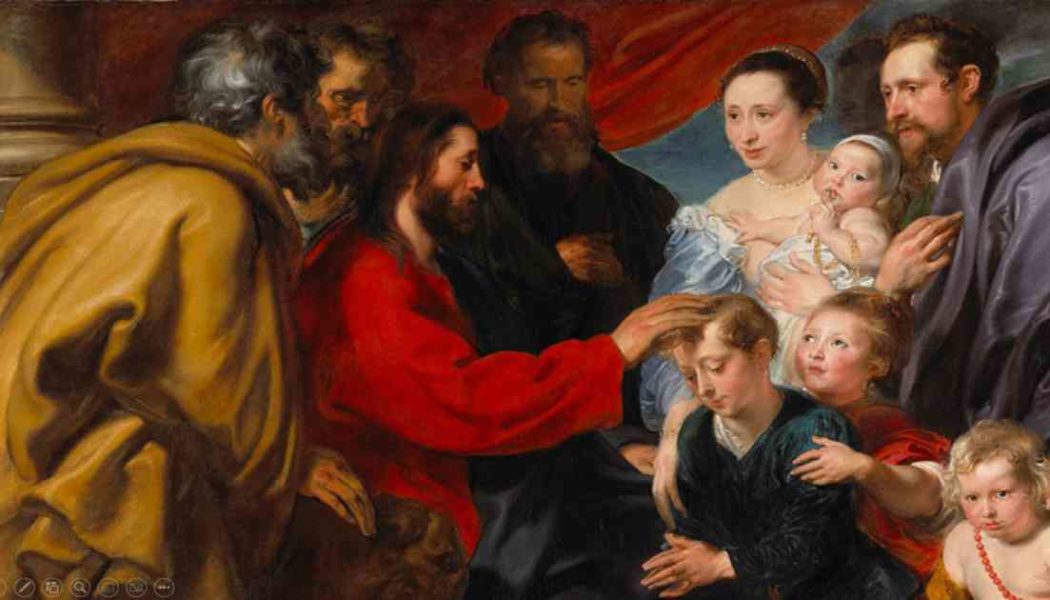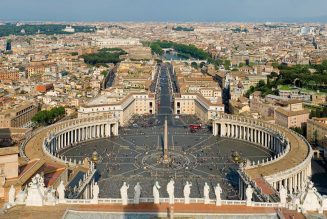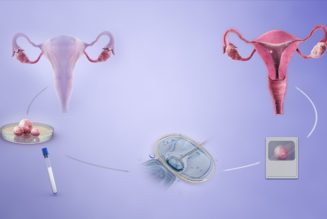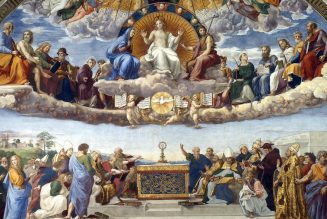
The Gospel for the 26th Sunday of Ordinary Time, Year B, shows Jesus denouncing sin in the strongest possible terms. It’s no wonder: The world has been destroyed by sin and the Church has been shipwrecked by it — in fact, by men and women who were taught to sin as children.
But Jesus also gives a giant promise of hope for our future.
Fully 60% of the words in this Sunday’s Gospel passage are Jesus warning of harsh, dire consequences for sin.
Jesus says, “If your hand causes you to sin, cut it off. It is better for you to enter into life maimed than with two hands to go into Gehenna.” He says the same thing about your feet and your eyes.
This is Semitic hyperbole; it doesn’t mean you should literally maim yourself. But it does mean that it is better to be a blind quadruple-amputee than to be committed to sin. It also means that you should eliminate anything in your life that draws you toward sin, be it your laptop, liquor, or your lifestyle — your friends, pass-times, or secret addictions.
Doctors amputate a limb in order to save the body. We have to amputate sin to save our soul. But we often do the opposite: We amputate our soul to save our sin.
Jesus describes where that will lead us — “to be thrown into Gehenna, where ‘the worm does not die, and the fire is not quenched.’” This is hell, which as described by Jesus Christ is a place where we are tortured from within, as if by a worm eating our soul, and tormented from outside, as if by fire that scorches us without burning us up, forever.
Jesus knows hell is real and urgently wants to warn us that we could go there if we aren’t careful. The Church agrees. The Catechism builds on Jesus’s analogy, saying mortal sin kills the love of God and one another in our soul far more than having no hands, feet or eyes does. In fact, it brings “the eternal death of hell, for our freedom has the power to make choices forever.”
To prove his point, Jesus cites one sin that we are rightly horrified by.
Jesus says, “Whoever causes one of these little ones who believe in me to sin, it would be better for him if a great millstone were put around his neck and he were thrown into the sea.” This passage comes right after Jesus “placed a child in their midst” and said “Whoever receives one child such as this in my name, receives me; and whoever receives me, receives not me but the One who sent me.”
Jesus is the merciful one who would leave the 99 behind to go after one sinner, but here Jesus describes sin by forcefully warning about a tortuous death. This is one of the harshest thing Jesus ever says, and he explains why: If to be kind to a child is to receive God, then to hurt a child is to destroy God in another person’s soul. And we all know that in too many cases “little ones” were not received in the Church with the holy, loving arms of Jesus, but with the sinful, groping arms of his representatives.
Recently Elizabeth Scalia wrote at OSV that the “little ones” needing to be protected are not always children:
“While some admittedly successful programs have been put into place to protect children from abuse, the predation against older teens, seminarians, religious men and women and others who might be classified as ‘vulnerable adults’ seems to generate less concern from our leadership.”
Priests who abuse or misuse “little ones” have started a story for Satan in someone’s life that will twist and warp that person into who knows what — either crushed or angry, silently bitter at God or aggressively antagonistic to him, or, in some cases, an attacker of innocence themselves.
But Jesus isn’t just warning about abuse and misuse.
Listen carefully to what Jesus says: He doesn’t say that whoever hurts a little one would be better off dead — he says whoever leads a little one astray would be better off dead.
In other words, Jesus is also condemning any one of us who by what we say or fail to say leads others to embrace immorality.
St. John Paul II understood this. During the 2002 sex abuse scandals, he gathered all the U.S. cardinals and told them not only that “there is no place in the priesthood and religious life for those who would harm the young,” but also that people need to know “that bishops and priests are totally committed to the fullness of Catholic truth on matters of sexual morality.”
Too often, the Church has led “little ones” astray not by hurting them, but by skimping on “the fullness of Catholic truth on matters of sexual morality.” Maybe we refused to teach against pre-marital sex and masturbation because it was too awkward to talk about; maybe we turned a blind eye to promiscuity or homosexual acts because the culture had embraced them; maybe we thought it was more compassionate to ignore Jesus’s words about divorce and remarriage or cohabitation than to share Jesus’s saving truth.
What we forgot is that to refuse to teach a person that sin is sinful is to prepare that person for a life of sin — followed by an eternity of agony if it isn’t repented. Jesus is saying that it would be better that a millstone be tied around someone’s neck than that they lead people astray like that.
The hope is coming, but first consider just how bad things have gotten.
When Pope Benedict XVI visited America in 2008, he said, “What does it mean to speak of child protection when pornography and violence can be viewed in so many homes through media widely available today?”
In many homes — we can even say most homes — one or more persons is secretly plunging online into a world of ugly sexual images, becoming more and more addicted and seeking increasingly perverse thrills. This secret epidemic has a relationship of unholy symbiosis with the human trafficking industry: Pornographic images create human trafficking customers, and human trafficking victims supply pornographic images.
Why aren’t we doing more to stop it? Because too many of us would rather risk exposing children to pornography than risk losing their own access to it. Now, most kids have seen hardcore pornography by age 13. A huge percentage see it from ages 8-10. Many others see it as early as 5. This has profoundly changed generations of “little ones.”
The fact is, through misdirection, lack of vigilance, failures of courage, and false charity, we have led people to broken hearts, broken bodies and broken relationships on a massive scale. Sexual sin is at the heart of the family breakdown that is the leading cause of poverty and of the epidemic of loneliness, and it is the engine driving the culture of promiscuity that metastasizes into a culture of sexual harassment. Sexual sin is at the heart of the STD epidemic, the abortion holocaust, and the horrors of human trafficking.
The world desperately needs Catholic wisdom on sexuality. They need to hear it from us. Jesus is our model here as well.
But we don’t just hear harsh words from Jesus this Sunday. We hear great hope as well.
The consequences of our sins are enormous and far-reaching, but Jesus says that the consequences of virtue are more powerful by far.
The Gospel begins with John saying, “Teacher, we saw someone driving out demons in your name, and we tried to prevent him because he doesn’t follow us.” Jesus replies, “Do not prevent him. There is no one who performs a mighty deed in my name who can at the same time speak ill of me.”
Jesus has an expansive, generous view of God’s grace. The fact is, driving out demons is God’s work, not man’s, and anyone who does it in his name — whether it’s the chief exorcist of Rome or a Louisiana Baptist who learned deliverance prayer — is doing God’s work.
Jesus also says “Anyone who gives you a cup of water to drink because you belong to Christ, amen, I say to you, will surely not lose his reward.”
That means the smallest act of goodness echoes in eternity. It means that to serve another person made in God’s image is to join in the project of love that Jesus Christ himself began. God has been telling us this again and again in scripture. In Song of Songs, we learn that “Love is greater than death.” St. Peter tells us that “Charity covers up a multitude of sins.” St. John says, “If we love one another, God abides in us.”
Love obliterates evil — because God is love, and we participate in his very life by doing his good.
In fact, the Church’s real story is service — not abuse. The chain of love that Jesus brought the world holds it together far more than our sins tear it apart. Christ’s followers unleashed a revolution of human dignity and human rights. Today, worldwide, it is the Church which feeds and educates the poor, defends the right to life of the most vulnerable, and provides health care to those in need, and Christ’s love has redefined the world’s morality.
And even now, baptized Christians have all the grace we need to change the world.
In the First Reading, Moses says to Joshua, “Would that all the people of the Lord were prophets! Would that the Lord might bestow his spirit on them all!”
He got his wish. Today, every baptized person does have the gifts of the Holy Spirit. We are each prophets. That doesn’t mean we can tell the future; it means we can tell the truth.
At each Mass we have the opportunity to unite with the Truth himself, Jesus Christ. Receiving him — body, blood, soul and divinity — in communion separates us from sin and strengthens our love.
The steps we take in the communion line at Mass are the first steps we take toward building the civilization of love Jesus came to establish.
Image: Anthony Van Dyck, Suffer the Children, Wiki-media.









